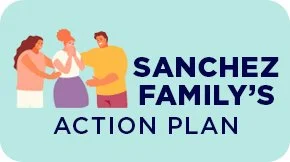Crisis Case Studies
When you’re in crisis, sometimes it’s hard to know where to start. Finding the right resources can feel overwhelming with so many organizations, directions, requirements, and deadlines to keep in mind. Listed below are case studies of 5 different people: Don, Jenny, Lucia, Maria, and the Sanchez family. While all of these cases are fictionalized, they are based on real stories of people in crisis trying to find resources. Click on each case’s “action plan” to access a step-by-step plan for how each person or family should locate and register for resources in Azusa and the surrounding community.
Don is a 61-year old Caucasian homeless man who has been living out of his 2000 Toyota Corolla for the past five years. He has struggled with alcoholism and methamphetamine use since he was 30 years old. He divorced when he was 35 and has not seen or spoken to his two daughters in 20 years. He has worked odd-end minimum wage or cash jobs over the years and has not been able to hold a job for more than eight months since his substance abuse began. He has about $3000 in savings, which is leftover from $30,000 in inheritance he received in 2008 after his mom passed away.
Don is having severe tooth pain and back pain but is concerned that an ER visit will deplete all of his savings. His back pain prevents him from working and he receives between $30-50 per day by holding signs at freeway exits, most of which he spends on drugs and alcohol. His wallet and phone were recently stolen, so he does not have any ID or internet access. He has thousands of dollars worth of outstanding bills, all of which have gone into collections in 2013. As a result, he does not want to have a “paper trail”, and is wary of getting involved with anything that requires identification. Don will need to be convinced to establish his necessary paperwork.
Jenny is a 27-year old African American woman. She lives with her father who is a widower. She has a BA in Philosophy from UC Berkeley and has not worked since graduating due to her depression and anxiety. She has been studying for her law school entrance exams for the past two years. Her older brother is a successful lawyer and lives in Boston. Jenny has struggled with depression for her entire life and has attempted suicide two times in college. Her father molested her when she was a child but she has little recollection of this. However, when her brother came to visit with his family, Jenny’s memories of the molestation began to emerge when she saw her father playing “doctor” with her brother’s 7-year old daughter.
For the last two years, Jenny has been having paranoid thoughts and hearing voices. Her behavior has become erratic and she does not have any friends. She has not taken any medication and the paranoia and voices have been increasing in intensity. She has left her home because she believes her father is trying to kill her. For the last five nights, she has been sleeping just outside the public library and has not showered because she believes public water contains poison. She has just been cut from her father’s health insurance due to her age. She was recently released from a 5150 hold, leaving her with a $24,000 bill from Foothill Presbyterian Hospital.
Jenny does not have a car, phone, internet, and has only $100 left in cash.
Lucia is a 17-year old single mother to two sons, ages 3 and 1, and came to Los Angeles from Mexico when she was 12 years old. Both sons have different fathers, both of whom are incarcerated for drug and gang violence. She dropped out of school when she was 14 years old and speaks very little English. She is living with her mother and her sister, Teresa, and Teresa’s family (husband and three children) in a 2-bedroom apartment. She has a strained relationship with her sister and her husband, who accuse Lucia of being lazy and taking financial advantage of their mother.
Lucia has not sought out any services or programs because she is undocumented. She and her children have Medi-Cal but she is terrified that seeking more services will result in their deportation. Additionally, her 3-year old son’s pediatrician has recommended that she seek evaluation for her son, who shows signs of autism and developmental delays.
Her mother has unexpectedly passed due to sudden cardiac death. The death has caused much grief in the family but has also escalated into Teresa giving Lucia 10 days to leave the apartment. Lucia has nowhere to go and is panicking. She would also like to reconnect with her older son’s father (Mario) who has been in Men’s Central Jail for the last two years.
Lucia has $400 left, no phone, internet, or car.
Maria is a 64-year old widow. Her husband Carlos died six months ago due to Covid-19. Maria did not work most of her life due to caring for their severely disabled adult son who died ten years ago. After their son’s death, she found work as a seamstress, but had to quit two years ago due to her worsening rheumatoid arthritis. Maria speaks very limited English. Carlos was much more fluent, and took care of all the family finances and logistics. He made $35,000/year as a handyman and paid his taxes, making Maria eligible for benefits. She has $70,000 in savings and lives in a 1-bedroom apartment ($1500/month).
She just learned that her 35-year old son David will be released early from Chino Men’s prison in 2 weeks, after serving a 15-year term. David will be living with Maria and would like to begin the steps of reintegrating back into the community and finding a job.
Susan Sanchez is a single, 45-year old Native American (Gabrielino tribe) mother to Mark (17) and Sonia (12). Susan works 60-70 hours a week between two minimum wage jobs. They live in a 2-bedroom house rental ($1800 per month) and their landlord has just informed them that the house has sold and they have 14 days to move.
Mark has always been an average student, but he is currently in danger of not graduating due to chronic absenteeism and failing his classes. Last month, he was hospitalized for a suicide attempt and he continues to struggle with anxiety and depression. He spends most of his time playing video games. Susan would like for Mark to learn how to drive and work a full-time job after graduating so that he can help support the family. Sonia spends most of her time on social media and also struggles with depression. She has a severe cavity and has not seen the dentist in four years.
The father of Susan’s children stopped communicating with the family two years ago, and has stopped paying his monthly child support. Susan would like to begin the steps to reclaim the child support money but does not know where to start.





